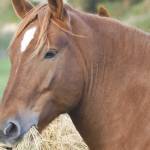Age Influences Insulin Dysregulation in Horses

Studies suggest that insulin dysregulation occurs in obese horses offered diets rich in nonstructural carbohydrates. When coupled with predisposing factors, overconsumption of sugars and starches desensitizes these horses to insulin, the hormone that controls blood sugar levels. As a result, the pancreas must produce more and more insulin to maintain circulating glucose within normal ranges.
Many factors influence the development of insulin dysregulation, including:
- Breed (easy keepers and pony breeds more often affected);
- Body condition (overweight horses are believed to suffer insulin dysregulation more frequently);
- Stage of pregnancy and lactation;
- Concurrent disease conditions (e.g., equine metabolic syndrome (EMS); PPID or equine Cushing’s disease);
- Physical activity (i.e., lack thereof); and
- Diet (those high in sugar and/or starch).
“According to a recent study, age also impacts insulin dysregulation and may play a more important role in the development of insulin abnormalities than once thought,” noted Kathleen Crandell, Ph.D., a nutritionist for Kentucky Equine Research.
To determine the impact of age on insulin dynamics, researchers recruited 8 adult (5-12 years old) and 9 aged mares (19-24 years old). Horses were divided into groups and fed a hay-only diet, a starch/sugar-rich diet, or an oil/fiber-rich diet for 6 weeks. Insulin responses were subsequently assessed.
“In this study, higher insulin levels and lower sensitivities to insulin were observed in older horses regardless of the diet fed,” explained Crandell.
Age-related changes to insulin regulation occurred in healthy horses with normal body condition scores and no evidence of PPID (equine Cushing’s disease), again suggesting that age and not obesity could be a more important contributor to insulin dysregulation.
“Researchers found that certain horses appeared to benefit from the addition of nonstructural carbohydrates to the diet to enhance uptake of glucose. Exercise studies conducted at Kentucky Equine Research yielded the same results,” Crandell explained.
Nutritionists also recommend routine exercise, maintenance of appropriate body weight, and limited starch, sugars, and nonstructural carbohydrates for horses at risk for insulin dysregulation and EMS.
Need help determining an appropriate diet for your horse? Consult a Kentucky Equine Research nutrition advisor today!
*Rapson, J.L., H.C. Schott II, B.D. Nielsen, et al. Effects of age and diet on glucose and insulin dynamics in the horse. Equine Veterinary Journal. In press.
This article was edited for clarity.








